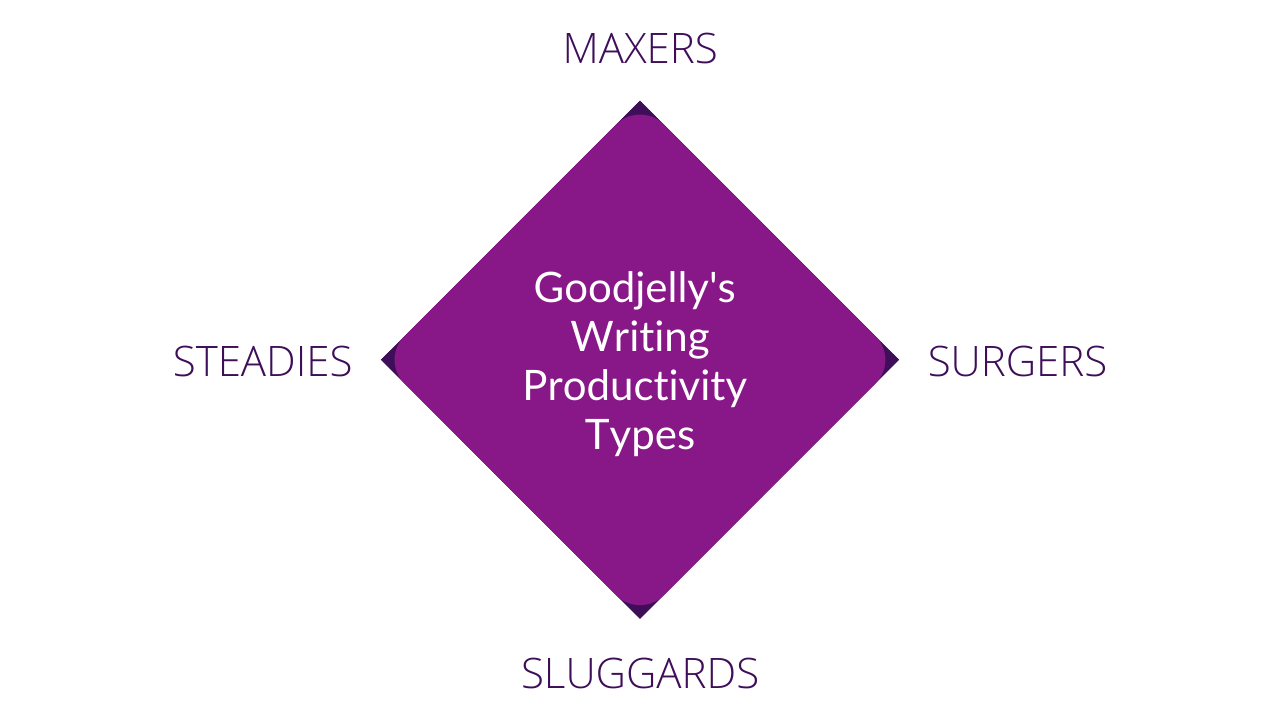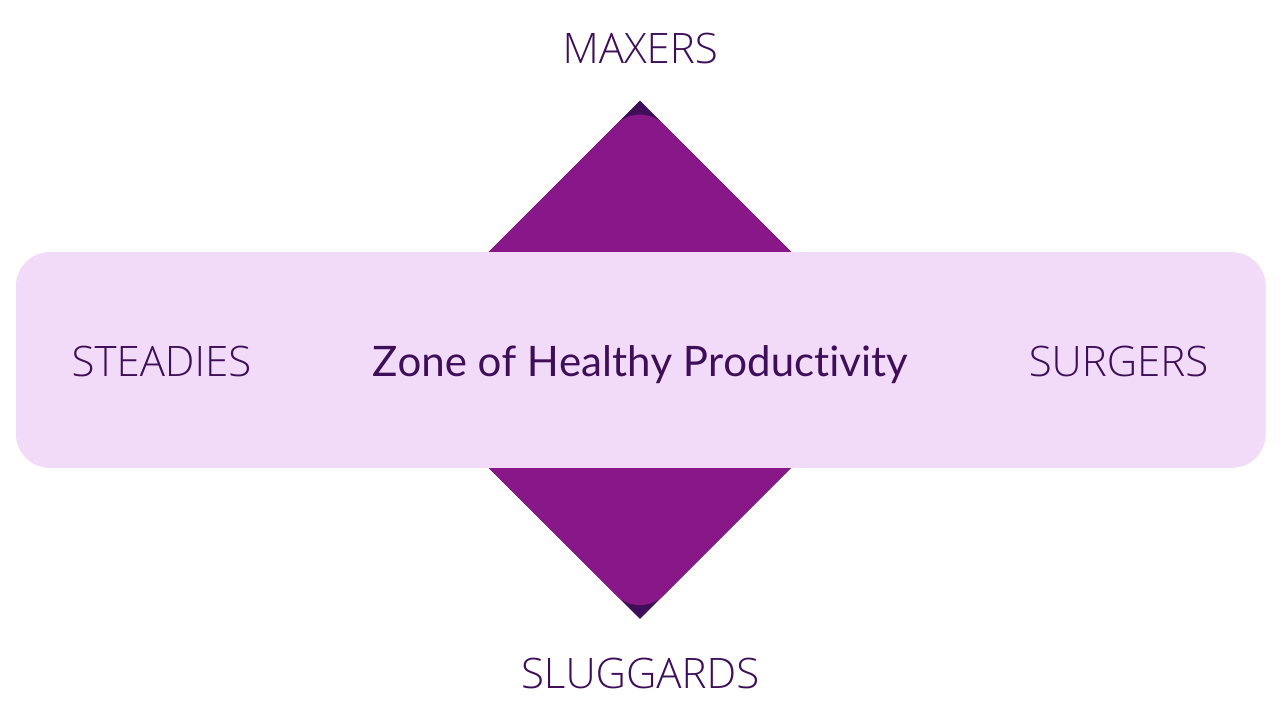The 4 Writing Productivity Types

By Christine Carron
One of the most productive (and kindest) moves you can make as a writer is to work with yourself instead of against yourself. Meaning that you organize your writing work, your writing schedule, your entire writing adventure in a way that aligns with . . . you.
The problem is that we writers are bombarded by so many writing rules, norms, myths, expectations, judgements, opinions, shoulds and the like, that even if we have a sense of what’s really aligned with who we are, it’s hard as heck to trust it.
Especially if we have not yet achieved even the base-level of success we want to achieve. (Hello, all my fellow pre-published writers out there. I so feel you!)
So today, I want to focus on productivity itself. And the four productivity types I’ve identified after working with thousands of individuals over my career. These types apply equally and powerfully to writers who want to be productive in a way that feels great, exciting, and energizing.
That kind of productivity only comes when you approach productivity in a way that aligns with you. And it's the kind of productivity that will make it easier for you to get your writing done, which is a requirement, of course, for making your writing dreams come true.
The 4 Productivity Types
The four productivity types are:
Maxers | Who strive to write at top capacity (speed, frequency, quality, etc.) at all times.
Sluggards | Who make inconsistent progress with their writing due to lack of interest or drive.
Steadies | Who make measurable progress on their writing work through steady, consistent progress.
Surgers | Who make measurable progress on their writing work through tidal-like surges of intensity.
I invite you to pause for a moment before you read further and ask yourself:
- Which type feels most naturally you?
- Is that the same type that you wish you could be?

My guess is that no writer reading this post is, or wants to be, a Sluggard. Indeed, in my entire career, I came across only one person that I potentially would categorize as a true Sluggard. And even on that guy, I’m still torn. It could be that I simply didn’t get his particular genius.
So, no matter how lacking you feel your current productivity or output level is, you would have to work really, really hard to convince me that you are actually a Sluggard.
Most often what I find is that writers feel like Sluggards because they are trying to be Maxers.
The Maxer Myth
Many writers set a personal standard, either consciously or subconsciously, that they must produce at the maximum level during every writing session or they have wasted time. They are trying to make themselves into a Maxer.
Guess what? Attempting to be a Maxer puts writers on a fast track to exhaustion, burnout, and/or massive inner critic attacks.
Maxing is bad resource management. I’ve seen this again and again. Especially in my rescue project management work, where I would be hired to reset projects that had gone completely off the rails. The first thing I had to do on those types of projects was bring folks back from the Maxing brink.
Energy, imagination, creativity, health, motivation, and morale are all resources that suffer from a Maxing mentality. And as a writer, those are also the very assets you want to protect, not degrade.
You don’t actually have to search hard to find real world examples of Maxing gone amok. Consider this excerpt from a recent article in the New York Times, The Rise of the Worker Productivity Score, which is about how companies are using digital monitoring technology to try to force Maxing:
“. . . digital productivity monitoring is also spreading among white-collar jobs and roles that require graduate degrees. Many employees, whether working remotely or in person, are subject to trackers, scores, “idle” buttons, or just quiet, constantly accumulating records. Pauses can lead to penalties, from lost pay to lost jobs.
. . . Architects, academic administrators, doctors, nursing home workers and lawyers described growing electronic surveillance over every minute of their workday. They echoed complaints that employees in many lower-paid positions have voiced for years: that their jobs are relentless, that they don’t have control — and in some cases, that they don’t even have enough time to use the bathroom. In interviews and in hundreds of written submissions to The Times, white-collar workers described being tracked as ‘demoralizing,’ ‘humiliating’ and ‘toxic.’”
Maxing dystopia, here we come.
(If you want to get a sense of how dystopian this kind of monitoring technology feels, go read the article. They’ve installed and exposed a tracking system on the page. It rates your reading/comprehension “performance” as you go.)
A Healthy Productivity Continuum
At this point, I’ve suggested you are most likely not a Sluggard type (no matter any rumblings from your Inner Critic) and recommended that you stop trying to be a Maxer type. That leaves us with Steadies and Surgers.
The continuum between those two is what I call the Zone of Healthy Productivity, the place where you align with your personal rhythms and strengths to make healthy, sustainable, and joyful writing progress.

Sluggards don't fit into the zone for obvious reasons: if you’re not interested in engaging in your writing, then writing will not get done. (Note: Being blocked is different than being a Sluggard.)
You still, however, might be having a harder time buying that Maxing doesn't make the productivity cut.
Maxing certainly gives a good impression of being productive. And it actually is productive in the short term. Which is why people try to bottle it. Go at full throttle all the time. But Maxing simply is not sustainable long term. It’s not even really possible despite this whole worker productivity scorecard trend. We are not machines. (And even machines conk out unless they get regular care and maintenance.)
Trying to sustain Maxing and failing to do so also leads to morale and motivation issues, which piles even more productivity challenges on top of burnout and exhaustion.
Am I saying anyone working hard or intensely is Maxing? Not at all. When you are in a flow state—i.e., absorbed in your writing, time falling away, focus deep and intense—you are highly productive. Can even go head to head with a pre-burnout Maxer.
Both Steadies and Surgers rock flow states, and, as a result, there is a massive difference in the tone and quality of their productivity compared to Maxers. In a flow state, heightened productivity comes from inner power and alignment. For Maxers, productivity is driven more from force and striving.
Finding Your Productivity Sweet Spot
Do you have a sense of which type, Steady or Surger, more closely fits your natural writing rhythm? I definitely lean more toward Surger. That’s why the common advice to write daily feels like Maxer mentality to me. I write more productively when I allow myself to ebb and flow.
For Steadies, “write daily” seems like the most natural and obvious writing advice ever uttered. Writing daily will feel completely natural to Steadies. That’s the way they roll. No Maxing needed.
This is an example of why it is so important to think about your productivity type.
Advice that totally works for other writers, won’t work for you, and vice versa. That doesn’t make the advice wrong, or right. It just makes it wrong, or right for you. For your particular productivity type.
That level of clarity will infuse your productivity with both power and grace. And also will help you make the writing progress you want to make.
Happy writing steady, or in surge, or somewhere in between. In all cases, you’ve got this!
Don't miss a single dollop of Goodjelly
Subscribe for the Latest Blog Posts & Exclusive Offers!
You can easily unsubscribe at any time.


